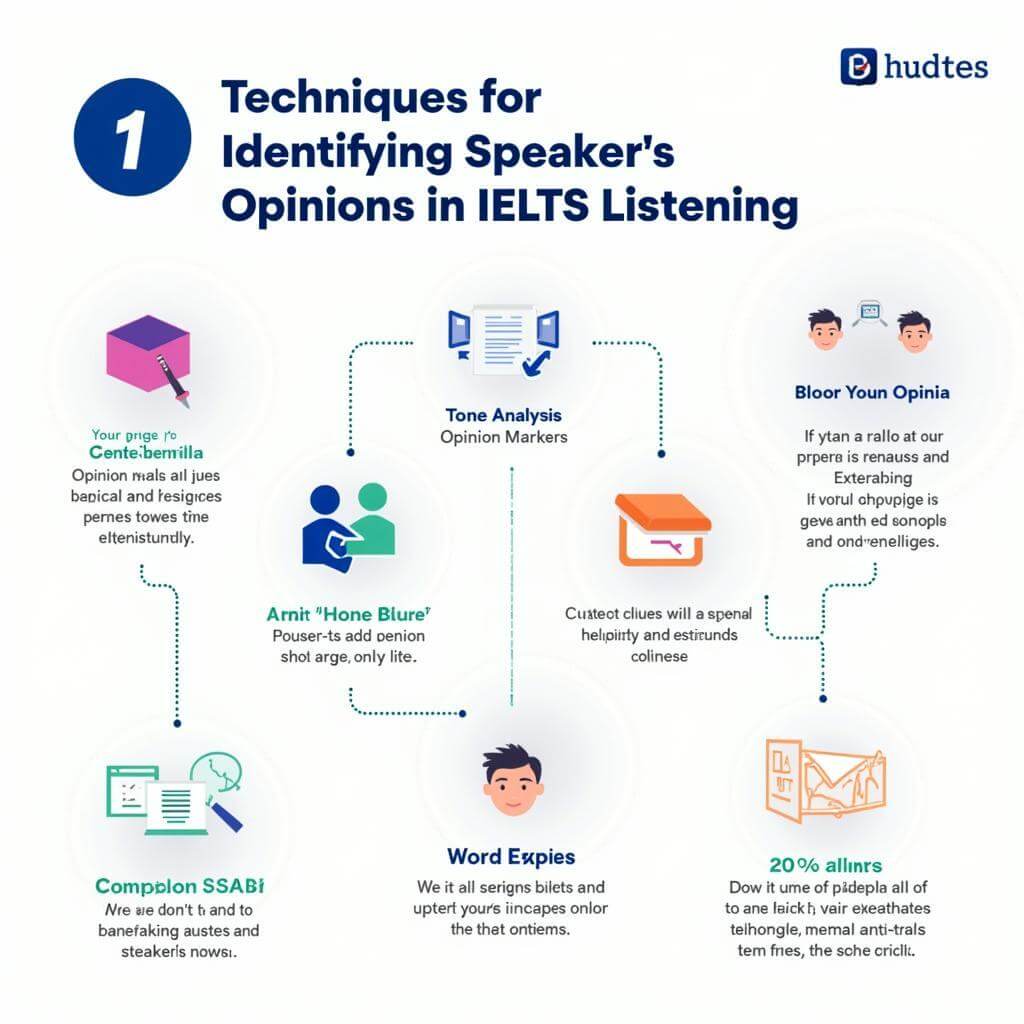The IELTS Listening test is a crucial component of the exam, and one of the key skills required is the ability to identify specific speaker’s opinions. This skill is essential for accurately answering questions and achieving a high score. In this article, we’ll explore effective techniques for listening for specific speaker’s opinions in the IELTS test.
Understanding Speaker’s Opinions in IELTS Listening
Recognizing and understanding a speaker’s opinion is a critical skill in the IELTS Listening test. It involves more than just hearing words; it requires interpreting tone, context, and language choices to grasp the speaker’s perspective on a topic.
Key Aspects of Identifying Opinions
- Tone of voice
- Use of opinion markers
- Context clues
- Emphasis on certain words or phrases
- Comparison and contrast statements

Examples of Opinion Markers in IELTS Listening
To effectively identify speaker’s opinions, it’s crucial to recognize common opinion markers. Here are some examples you’re likely to encounter in the IELTS Listening test:
- “I think…”
- “In my opinion…”
- “From my perspective…”
- “It seems to me that…”
- “I believe…”
- “As far as I’m concerned…”
- “I’m convinced that…”
- “My view is…”
- “I would say that…”
- “To my mind…”
These phrases signal that the speaker is about to express their personal view on a topic.
Applying Opinion Identification in IELTS Listening Tasks
In the IELTS Listening test, you’ll encounter various question types that require you to identify speaker’s opinions. Let’s look at how to apply this skill in different scenarios:
Multiple Choice Questions
For multiple choice questions, listen carefully for opinion markers followed by the speaker’s main point. The correct answer often paraphrases this opinion.
Example:
Audio: “In my opinion, the new library design is both functional and aesthetically pleasing.”
Question: What does the speaker think about the new library design?
A) It’s purely functional
B) It’s only aesthetically pleasing
C) It combines functionality and visual appeal
D) It needs improvement
The correct answer would be C, as it accurately summarizes the speaker’s opinion.
Matching Opinions to Speakers
In this task type, you need to match stated opinions to specific speakers. Pay attention to each speaker’s unique perspective and any disagreements or agreements between them.
True/False/Not Given Statements
For these questions, you need to determine if the statement aligns with the speaker’s expressed opinion, contradicts it, or if the opinion on that specific point wasn’t mentioned.
Common Mistakes in Identifying Speaker’s Opinions
When listening for specific speaker’s opinions, test-takers often make these mistakes:
- Confusing facts with opinions
- Misinterpreting neutral statements as opinions
- Missing subtle expressions of opinion
- Focusing only on explicit opinion markers and missing implied opinions
- Failing to distinguish between different speakers’ opinions in a conversation
To avoid these pitfalls, practice active listening and pay attention to the overall context of the conversation.
Strategies for Improving Opinion Identification Skills
To enhance your ability to identify speaker’s opinions in the IELTS Listening test, try these effective strategies:
- Practice with varied accents and speech patterns
- Listen to podcasts and identify the host’s and guests’ opinions
- Watch debate programs and summarize each speaker’s viewpoint
- Engage in conversations where you actively listen for others’ opinions
- Take practice IELTS Listening tests and focus specifically on opinion-based questions
Conclusion
Mastering the skill of listening for specific speaker’s opinions is crucial for success in the IELTS Listening test. By understanding opinion markers, practicing with various materials, and avoiding common mistakes, you can significantly improve your performance in this area. Remember, consistent practice and exposure to diverse English-speaking content are key to developing this essential skill. Keep refining your techniques, and you’ll be well-prepared to tackle opinion-based questions in your IELTS Listening test.